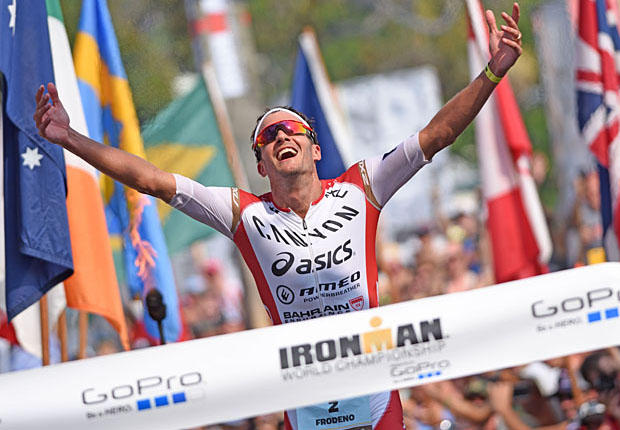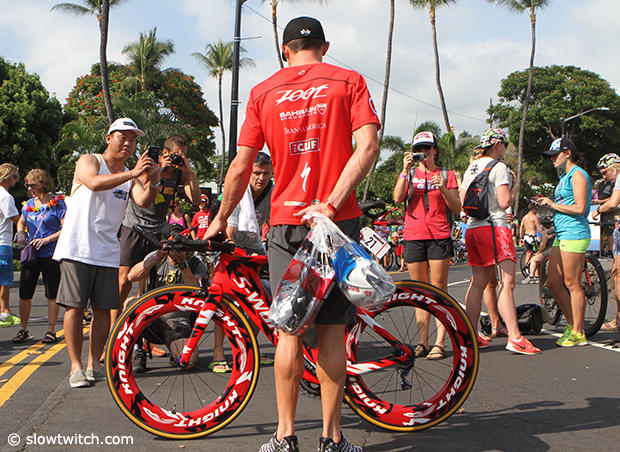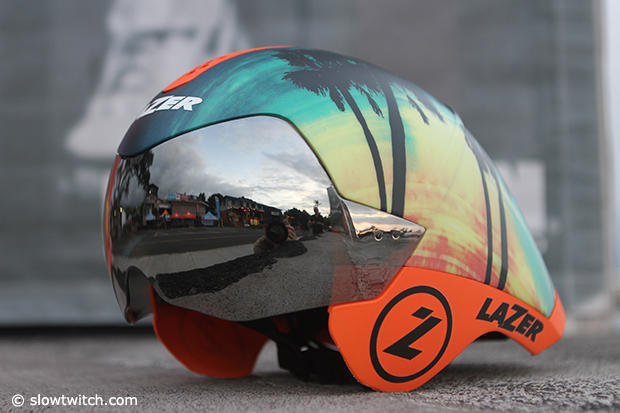For Jan Frodeno it’s Kona All Over!
Jan Frodeno proved he’s the world’s best long distance triathlete for the second year in a row, and this time with an exclamation point.
The tall and lanky German superstar, who began his triathlon career as an Olympic Gold Medalist in 2008, expanded his repertoire by winning a world championship at the 70.3 (half-Ironman) distance in 2015, and who cemented his dominance with a win in Kona later last year, has done it again. He’s won the granddaddy of triathlon events for the second year, probably over the strongest field to ever toe the line, and did it while breezing home, high-fiving, in a fast (but not record) time of 8:06:30.
From the starting gun Frodeno handled the pacemaking in the water, with Estonian Marko Albert glued to his hip the whole way. Tucked in behind the pair, with the best seat in the house, was American Andy Potts. ITU specialist Harry Wiltshire and Brent McMahon were close to the front. A lead pack of just more than a dozen shed the balance of the pro men’s field by the swim turnaround, testifying to the fast pace.
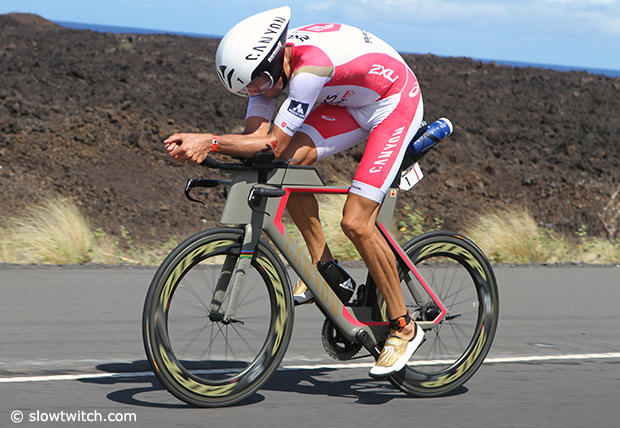
Nearing the finish of the swim were two tracks in the lead, 10 meters apart: Frodeno’s pack, and then a lone pair consisting of Andy Potts and Paul Matthews. By the time they got to the end of the pier, 50 meters from the finish, it was clear Potts had the angle, and the lead. But Wiltshire sprinted madly with 30 meters to go to exit the water first.
Frodeno, Matthews, Albert, Denis Chevrot, McMahon, Andi Böcherer, Tom Don, Ruedi Wild, David McNamee, altogether 12 athletes were in the lead swim pack at 48:16 or faster. Another dozen were underneath 49-minutes flat.
Satellite imagery produced earlier in the week suggested the turnaround buoys were moved closer by up to 100 meters, and the fast finish times lent credence to the conspiracy notion that the swim is slightly short of its historic distance.
Potts, Brent McMahon, Tim O’Donnell and Jan Frodeno established themselves early as the front pack’s leaders. But in truth there was no break in the field and, indeed, the second pack of swimmers quickly closed down the front pack of riders, forming a steady stream on the road of at least 2 dozen, the last of which was only a half-minute from the leader.
The 40-year-old Potts bore down and took the lead after the traverse through town. He and Brent McMahon took turns in the lead. Some distance behind a group of überbikers had formed. Former winner of this race Sebastian Kienle along with Jordan Rapp and Jesse Thomas were caught by Joe Skipper, Michael Weiss, Ronnie Schildknicht and Bart Aernouts. With horsepower of this kind at least some among this group would undoubtedly ride up to and eventually through that large front pack.
Weiss began to assert himself on the way back from Hawi. Last year’s third-place finisher, Tim O’Donnell, riding his Stars & Stripes Speed Concept in his Stars & Stripes outfit (anyone know what country he’s from?), decided to throw down, just as he did last year, trading the lead with Weiss on the way down from Hawi. This bike ride today dispelled the commonly-held rules notion that if the front-runner is passed he must drift to the back of the pack. Weiss and O’Donnell continued to trade pace with third-in-line content to stay there, 11 all-told in the front group, the officials content with what they were seeing.
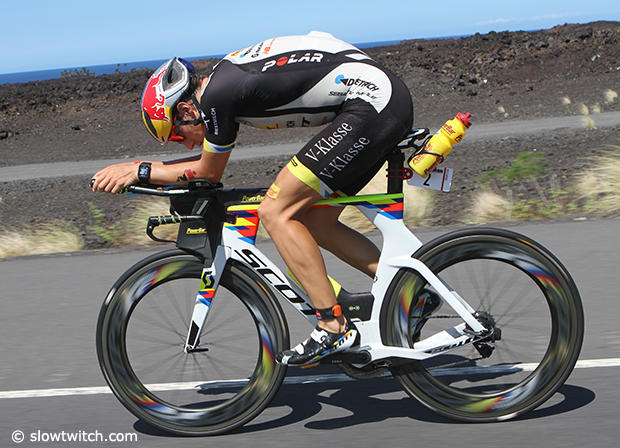
Further back, in a pack of 1, motored Lionel Sanders, riding faster than anyone to that point in the race.
Officials were not kidding and Van Lierde, McMahon, Raelert and Lange all dropped out of the front pack to serve penalties before the outbound Kawaihae turn, only an hour and a quarter into the ride.
Luke McKenzie and Tim Van Berkel moved into the lead, and after the turn at Kawaihae and the ensuing gentle-but-lengthy ascent Frodeno spent a lot of time out of the saddle and on the pursuit bars. It looked like he was struggling, but on further inspection this seemed his posture whenever he was in danger of creeping into the draft zone of the rider in front of him.
Between 40 and 50 miles into the bike ride the join was made. Like cheetahs biting at the feet of the slowest antelope in the herd, the Thomas-Weiss-Kienle-Böcherer group began to pick off the weaker among the lead group. Weiss appeared the strongest, or at least the most eager, aboard his Ducatti-looking Diamondback Andean. Jesse Thomas was the eyebrow-raiser. The former 8:35 3000-meter steeplechaser had the best pure run chops of all the frontrunners.
After the turnaround at Hawi Weiss, Kienle and Böcherer took turns pummeling the remains of the front group which still numbered more than a dozen. Sanders rounded the turn 3 minutes down, but still with the fastest time to that point – a minute faster than Kienle.
After miles of a gradual descent riders turn at Kawaihae and it's it’s climb after climb. This is where a strong and enterprising cyclist might take advantage of his rivals and Australian veteran Luke McKenzie did just that. He vaulted into the lead, leaving heretofore confident frontrunners O’Donnell and Weiss scrambling to keep up. His was the move. Andy Potts, having stayed comfortably in the pack, started to falter.
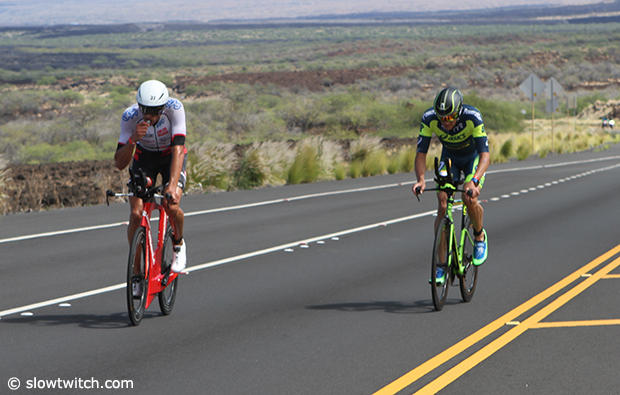
Then Michi Weiss, the power in the field up to this point, blew as well . He and Potts drifted back, with Weiss sitting up. By 90 miles they were struggling to keep sight of the front group. McKenzie’s move was the deal breaker. But Frodeno, Kienle, O’Donnell and the others were still in tow.
By 100 miles into the ride it was O’Donnell starting to fray at the edges. Further back Lionel Sanders was running out of gas. After having gotten to within 3 minutes of the lead he was now about 4:30 back.
Sebastian Kienle, winner of this race 2 years ago, co-favorite going in alongside last year’s winner, fellow German Jan Frodeno, led himself and 6 other riders to the bike finish. They came into transition 5hr14min into the race, meaning a fast run would threaten the course record.
Those in touch with Kienle were Frodeno, McKenzie, Hoffman, Boris Stein, Böcherer and O’Donnell. Three minutes in arrears was Eneko Llanos, with Marko Albert and Michi Weiss – who’d pulled himself together – about 4:30 down. Then it was Lionel Sanders and his 6–minute deficit sounded like a lot, but no one in front was safe from this guy. Andy Potts looked ragged coming in on Sanders’ heels.
Boris Stein captured the fastest ride of the day, 4:23:05, just ahead of Kienle’s 4:23:56. Michi Weiss’ charge to the front on his wild Diamondback, along with his equally abrupt collapse, netted him the third split of the day in 4:25:52. Sander’s 4:26:35 had the fourth split.
By a mile into the run it was Frodeno, with Kienle sometimes just behind, sometimes alongside, sometimes just in front. On paper Frodeno was the faster runner, but Kienle impressed with very strong runs during his 2016 season. Two miles into the run these fast friends off the course shared a joke and a smile. Best to get the smiles in now because Chrissie Wellington and Natascha Badmann are the only winners of this race ever to smile throughout.
First it was Frodeno in the lead by a shoulder, then Kienle. These two started the run at 6-minute pace, certainly fast and certainly record pace, and the pace many run for the first 10 miles but nobody runs for 26.
Separation finally came as the runners returned to downtown, 9 miles into the run and just before the runners leave the village of Kailua, on the right turn that takes you up the hill and out of town. It was Frodeno who forced the gap. By the time the two had crested Pay-N-Save Hill (Palani Road) Frodeno had a 40-meter lead. But you never know in this race.
Through 10 miles of the run it was an all-German podium: Frodeno, Kienle and Andi Böcherer. The U.S. held the next places, with Hoffman and O’Donnell, then Germany (Stein) and the U.S. (Potts, looking revived after a tough last few miles of the bike and a tumble off the bike coming into T2).
The drama from behind wasn’t Jesse Thomas, nor Lionel Sanders. It was Patrick Lange, U.S. Champion at Ironman Texas with a frightening fast run. He was a darkhorse here and especially after getting a penalty early in the bike ride. Lange threw down the run of which many feared he was capable, looking like this generation’s Greg Welch.
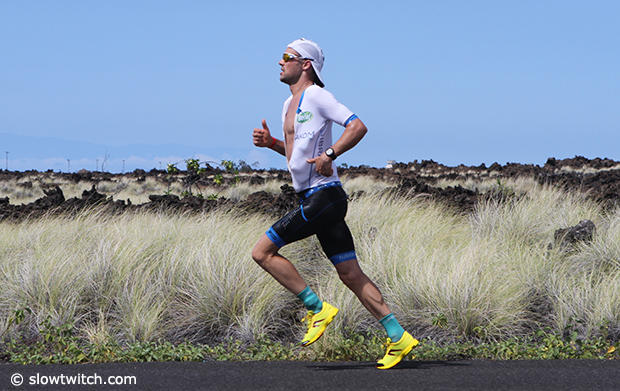
Lange tore through the field. At 5 miles into the run he was 14th place. At 10 miles he’d climbed to 9th place. With fewer than 5 miles to go he passed Böcherer for 4th, then Ben Hoffman for 3rd. Kienle seemed a very safe 2nd, but Lange’s feet were on fire.
In the end Kienle held on for second, but Lange made it interesting. His run split of 2:39:45, a course record. This bests the 2:40:04 by Mark Allen in 1989's Ironwar (though there will be the question of whether transition times were included in Allen's run split).
"Jan is currently the strongest, and that's motivation to push hard next year," said Kienle. "I'm pretty close, not exactly where I want to be, but I have to be happy with it."
"It feels that much sweeter," said winner Jan Frodeno, and talked about the club of athletes who've won this race twice. "I'm so grateful to be here again.
"We got talked up so much before the race," said Frodeno about the race with Kienle, "especially in Germany." But it was clear that Frodeno and Kienle are fond of each other, and enjoy the rivalry. Frodeno's was not threatened over the last 16 miles, but he said after the race that he suffered mightily.
The all-German podium is not unprecedented. In 1997 Thomas Hellreigel, Jurgen Zack and Lothar Leder took the top-3 spots.
Ironman World Championships
Kailua-Kona, Hawaii
October 8, 2016
S 2.4 mi. / B 112 mi. / R 26.2 mi.
Results
Pro Men
1. Jan Frodeno (GER) 8:06:30
2. Sebastian Kienle (GER) 8:10:02
3. Patrick Lange (GER) 8:11:14
4. Ben Hoffman (USA) 8:13:00
5. Andi Böcherer (GER) 8:13:25
6. Tim O'Donnell (USA) 8:16:20
7. Boris Stein (GER) 8:16:56
8. Bart Aernouts (BEL) 8:20:30
9. Ivan Raña (ESP) 8:21:51
10. Frederik Van Lierde (BEL) 8:21:59
11. Andy Potts (USA) 8:25:35
12. Matt Russell (USA) 8:25:52
13. David NcNamee (GBR) 8:28:05
14. Marko Albert (EST) 8:28:20
15. Ronnie Schildknecht (SUI) 8:29:11
16. Jesse Thomas (USA) 8:29:40


